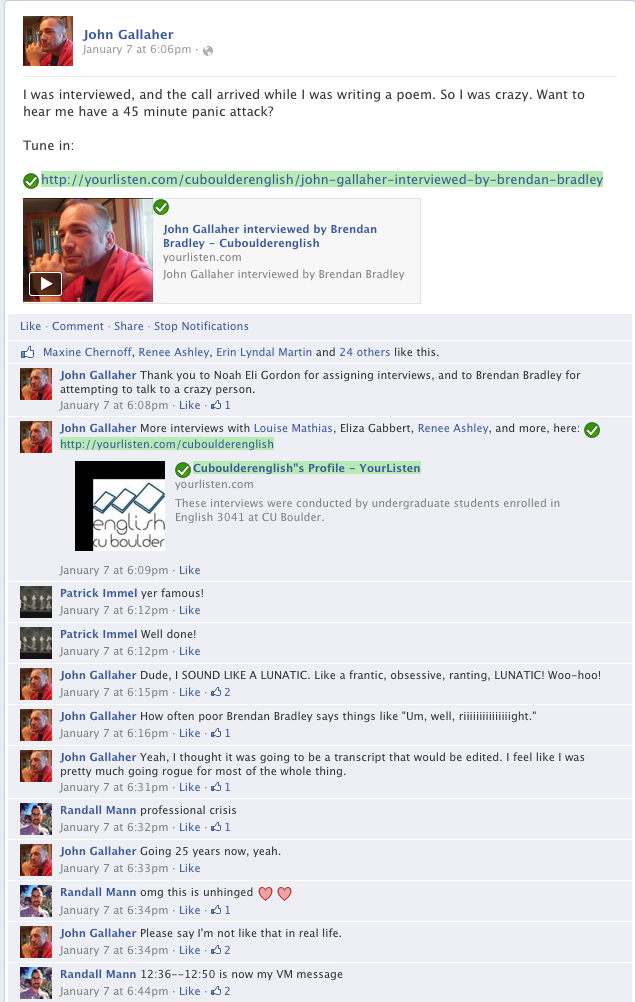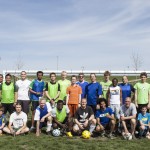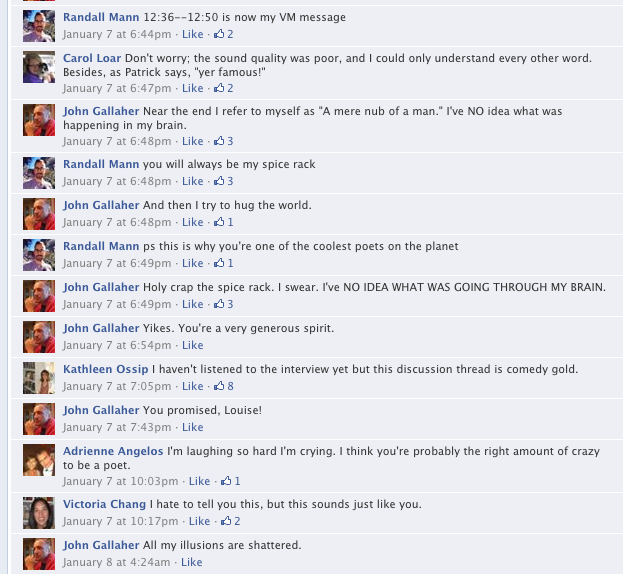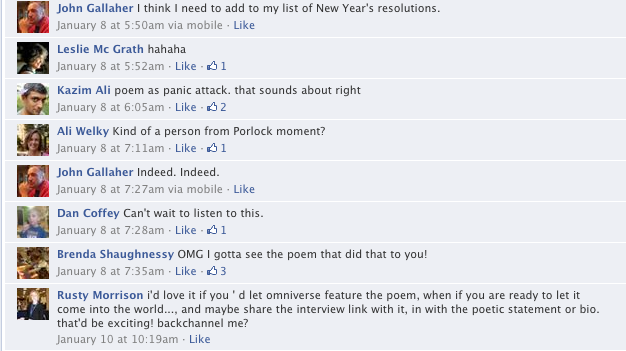Top 10 First World Problems
So let’s say you want to know something about the future,
which we all do, though most of us would agree
we don’t want to know when we’d die, except if we’re gravely ill,
I suppose, to know who to call or not to call. And we go about it
by consulting the inside of a skull. That would be kephalonomancy.
Or say we go about it by consulting the mold patterns on cheese,
which would be tyromancy. So far so good, but what
would it be called if the cheese is molding on the inside of a skull?
Now things are getting interesting, and how we go about
addressing it says as much about the incantation as it does where
we’re calling from. If you’ve never had orange juice, the saying goes,
then Tang might taste just fine. That definitely would make the “First
World Problems” list. As would making a “First World Problems” list
in the first place. That could be the joke answer that would make it
to number one, as a form of ironic self-congratulation for having the time
to play Sodoku, while waiting for your number to be called. But
certainly there must be games in all the other worlds, right? The way
one can say it’s the body that unifies us, how the sound
of crunching snow is the same for all of us, granting that we have
the time to contemplate snow, and have been to a frozen wasteland
with snow to crunch through. Better maybe to say the smell of dirt
after it rains, as sooner or later it rains everywhere, in much the way
that parenting occurs everywhere, and the terrible twos, unless that’s just
America, like how I read recently that in France no kids have hyperactive
disorders, that’s just an American designation, which is something
I’ve read in psychology as well, how disorders are as much cultural
as physiological. So there’s a problem, and a real reason to want
a crystal ball, or to call on God, who, according to Jeff Newberry,
lives in the suburbs. God’s one of us, then, if by “us” you mean people
in the suburbs. I admit that I rather like the idea of the God
of the suburbs. I like the fantasy that we’re safe here. I like the idea
that all the kids will have playground equipment in their yards,
and that Jimmy Stewart’s dog is bounding any minute past lines
of My Little Ponies, and each blade of grass is a blade of grass silhouetted
against the sidewalk. That’s something I’d love to get from a moldy cheese
frosted interior of a skull. And I’d love for us not to have complaints.
That the suburbs are inauthentic, that believing such things is simplistic.
My suburban high school drama teacher, Mr. C, I think kids called him,
but really I’m calling him “Mr. C” because I can’t remember his name
right now, showed up for work one morning, and, while in the school
office getting his mail, someone called his name, and as he turned
to say something, his back broke. It just crumbled. Would he
have wanted to know that was going to happen? He didn’t die
for another twenty years. Several of us went to see him in the hospital,
and he was a mess of wires and hoses. I had no idea what to say,
so I went back out to the waiting room, because waiting is what everybody
does most of the time, but what one is waiting for is the question
that separates us. Right now I’m waiting to find out if Mack Brown
is going to remain as the University of Texas head coach, which I’m
finding out is doubtful. I don’t have any stake in this, so I guess I’m not really
waiting, but that’s also a form of waiting, in the way we all wait for
fundamentally unimportant things. But it’s not unimportant in Texas
Football World, and that’s the kind of thing we usually talk about
when we say we want to know the future. Will Texas rise again?
Will there ever be peace in the Middle East? And what if the answer
would be “no”? What would we do with ourselves for the rest of our lives?
The open future is only interesting if we have hope. And here we are
still wanting to know it, even so, calling to the ether for inspiration.
Madame Sosostris, who could also be a reference to Madame Blavatsky,
gazing into the inside of a walnut, telling me the billboard will read,
“John Gallaher: Still Tha Mack.” And that “The Waste Land” sounds
clunky. “The Waste Place,” maybe, or, better, Eliot will decide “Waste-
A-Go-Go.” Something like that. The mechanical rabbit at the dog races
will get away, covered in lace and chicken wings. She or he will make it
to the suburbs with a bad case of Feline OCD. And here I am, still
precisely what I was, but already finished. It’s an old science fiction
paradox, culminating in “would you kill Hitler if you came upon him
as an infant?” It’s an Imagined World Problem, which is the problem of hope,
again, the hope of a voice calling from everywhere at once, “I give you . . .
light.” This is how I think of you, when I want to imagine there’s a you
I’m talking to. Tell me all about it: where you lived; what you cared about.
And I’ll see the pictures and yearn to walk those streets, to finally know
something. A couple weeks ago, I saw an interactive recreation
of Shakespeare’s London, before the fire, and there were no people. It’s
like those excellent hyperreal paintings I’ve seen by Richard Estes
of street scenes without people, that vague sense of dread that rises . . .
where did we go? A friend of mine writes to tell me that her granddaughter
looked at her, pencil in hand, Sunday, and asked, “What am I doing?”
Is this a question or a riddle? “All a part of nature’s plan” is the TV
version, if one’s watching reductive television, when “Carefree Highway”
is what we’re all kind of hoping for, where we can slip away. Let it be
someone else’s problem awhile, how everyone hates “moist”
but has no problem with “moisture.” Let that be the level of the cosmos.
Let tattooed fish crowdsource their ladder-climbing techniques
beneath the conspiracies of windshadow and fruit bats. What am I really
wanting here? To live at all times in all places? But that’s just another
God version, where the garden and stream are bound in glass.
Maybe “bound in glass” is the goal, where people keep telling me
I should be constantly crying over my children, who tomorrow will be
scattering me with dirt. The comic book is open to the chapter where
the heroine is riffing on the title of Cotton’s translation of Montaigne’s
“Of Practice:” “Use Makes Perfect.” John Cage had a version of use
I liked a lot, where if one goes out and does what everyone else is doing,
history slows, and if one goes out and does what no one else is doing,
history speeds up. And speeding up history is the good thing. He also said
that recorded music wasn’t music, and now, sixty years later, we’re left
with the partly obsolete hand-eye coordination practice of placing the
record player stylus onto the record. Maybe that’s why vinyl is making
a comeback, so that we’ll not lose the light touch. I read these things
as a version of knowing the future by knowing the past, that we lose
valuable skills as we go into the future. Handwriting is the next victim,
and then reading cursive, so all we’ll have by then is the transcriptions
that we’ll find with our new text search skills vs our old memory skills.
Finding, for example, that William (Lewis and) Clark, in his Expedition journals,
spelled the word “mosquito” 42 different ways will only be available
through secondary descriptions. How weird it is writing, now, knowing
how they’ll talk about writing, then. That’s a window into the future,
and what good does it do us? It’s like how weird it is that you can tell
some relationships won’t last, but the moment you realize it both is and isn’t
the actual end of said relationship. These things will no longer be here.
To mention them will be a story of the dangers of high permissions fees
and the heroes who battled them. It’s a relocation list. I feel I want to relocate
right now, but without going anywhere. I want to relocate from my home
to my home and get dessert twice. That’s why we research the origin
of our names, right? To walk those streets in the past and the future,
from the whatever world to this one? The Gallaher family came from Ireland
and tried to farm rocks in the American West to the dim sound of bagpipes.
Not the brightest bunch or the luckiest, and we all move into the future
in much the same way, parataxing the criminal scent of perspiration. So
here’s a list of things I’ll never do: I won’t ever get to New World Problems,
the odor that we forget that circled everywhere we’ve never been, friendly
poop, where every verse is crafted to take you back to a particularly painful
day in your life and rub your nose in it. Or what “suffrage” sounds like
it means, in relation to what it really means. It’s the logic of “Full Astern,”
which is the best reaction to all promises of the future, as there are no
satisfactory calculations of the negative effects associated with the
compassionate release of a highly aggressive invasive species into an
environment in which it has no natural predators. We just name it history,
and leave it there with books on sex after death and chapped lips. I have
this rash, see, and when I scratch it, my past comes off in flakes,
until there’s no one left, and I disappear into the aboutness.

 John Gallaher is the assistant coach of his daughter, Natalie’s U-12 travelling soccer team, The Maryville Twisters. He also subs when his son, Eliot’s U-8 soccer coach can’t make it. Turns out, this is a lot of fun. On weekends, he plays as well, though unbeautifully.
John Gallaher is the assistant coach of his daughter, Natalie’s U-12 travelling soccer team, The Maryville Twisters. He also subs when his son, Eliot’s U-8 soccer coach can’t make it. Turns out, this is a lot of fun. On weekends, he plays as well, though unbeautifully.

